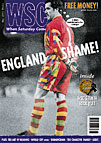 Richard Parkin describes how two fanzines set out to defuse a local derby with a recent history of trouble
Richard Parkin describes how two fanzines set out to defuse a local derby with a recent history of trouble
“I wish to state now that players, officials and fans of Sw*** n T**n (sic) have been, are and always will be SCUM.” So read an excerpt from one letter sent to the Oxford United fanzine Raging Bull. The fanzine’s editor, Ed Horton, was able to identify him as a regular contributor to the publication. This letter was one of many received in response to a joint initiative proposed by the editorial staff of Raging Bull and ourselves, the Swindon Town fanzine The 69er. The initiative addressed the growing problem of crowd violence at derbies between the two clubs. The letter, though untypical of the feedback we received, gave us an idea of what we were up against.
Within an hour’s drive of Swindon are four clubs that could be described as our ‘local rivals’, and yet all four relationships vary significantly. Meetings with the two Bristol clubs are always intense affairs, perhaps more so with City than with Rovers. With Reading, a club we have rarely played in recent years, the relationship is almost cordial. For some reason, however, it is the Oxford game that generates the most interest. Sadly, it also attracts the most trouble.
Six weeks in advance of the recent derby at the Manor Ground, we contacted Raging Bull with a view to launching a publicity campaign in the local media. For many years the supporters of both clubs had suffered intimidation caused by a small band of hooligans, many of whom would appear just for the two games each year. It had occurred to us that there needed to be a conspicuous opposition to the trouble not just from the clubs and the police, but also from the fans. We suggested that the majority should leave the minority in no doubt that if they fought, they would not be representing us, the city or town they lived in or the clubs they claimed to support.
The initial press release was issued four weeks before the game. Within 24 hours we had received supportive coverage on the local BBC and commercial radio stations.
Days later, we received confirmation that the clubs themselves wished to add their support. Swindon Chairman Mike Spearman agreed that an appeal we had written would be printed in the match programme for the last home game before the derby; he kept his word, and it appeared in the programme in its unedited form. On the same day, March 9th, a similar article was printed in the Oxford United match programme.
Unfortunately, the local press were less accommodating. The Oxford Mail grudgingly printed a section of the press release on the letters page one week after it had been issued. The Swindon Evening Advertiser ignored the campaign entirely. We thought it strange that that a newspaper that proudly claims itself to be ‘At the Heart of Swindon’ should choose to ignore an issue of such interest to a large section of its readership. Indeed, one letter and seventeen telephone calls later we were still none the wiser as the editor had flatly refused to speak to us.
In the preceding months, both newspapers had enthusiastically perpetuated a civic slanging match. “Swindon is a dump” proclaimed the Oxford Mail; the Advertiser rose to the bait superbly, accusing Oxford of being an enterprise-free zone, glorying in its past while choking on the fumes of its present traffic problem. Whilst this policy may have sold more newspapers, several letters in both papers referred to the forthcoming local derby in aggressive terms.
On March 19th, Oxford Utd beat Swindon Town 3-0. Losing by such a scoreline in a derby match is a humbling experience; having an ex-player, Joey Beauchamp, score the final goal right in front of you in the 88th minute compounds the misery. To the best of our knowledge, however, the game had passed with little or no trouble. This was confirmed the following week by PC Paul Phillips, Football Liaison Officer with Oxford police. In his opinion, the game had been the quietest local derby for years. From a crowd of over 9,000 there had been four arrests, all alcohol related. There had been no reported assaults and no reported damage to property.
The reasons for the absence of crowd trouble are not clear. Perhaps the policing had been more effective than at other games, or maybe it was the result that made the difference, the potential trouble makers being either too depressed or too delirious to bother. And just maybe, although we can never know, a joint initiative proposed by two football fanzines filtered a telling message through to the ring leaders.
Promotion is still a realistic possibility for both clubs this season. If this happens we will push the same message forward in advance of the fixtures next year: we will back our team to the hilt, and we will back them more vocally still when local pride is at stake. But violence is out.
From WSC 111 May 1996. What was happening this month